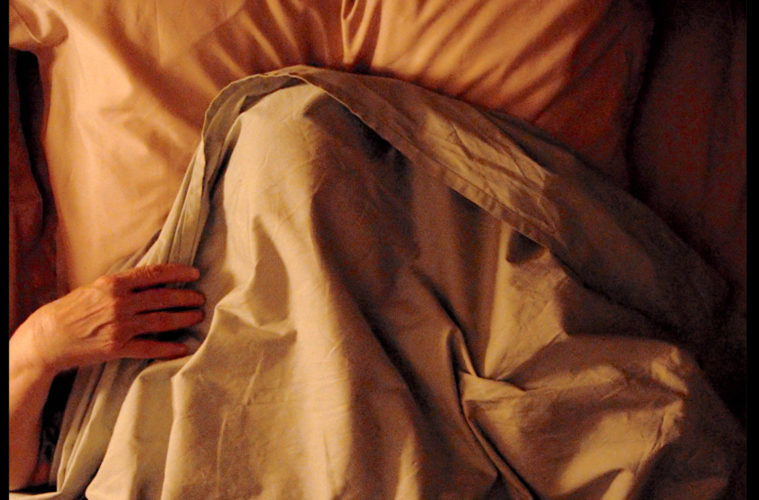 Director Gaspar Noé has carved out a unique kind of provocateur role for himself—he rubs our snouts in sex and violence and visual dazzle, but he’s also something of an arch-structuralist, busy reimagining how an often simple (but always despairing) story can be experienced. His new film, Vortex, couldn’t be simpler, narratively speaking: A very old couple, Lui and Elle (played by horror movie director Dario Argento and Françoise Lebrun), live in their book-cluttered Parisian flat, slowly succumbing to dementia and illness. Not a particularly fresh basket of bread, but look what Noé does with it—formalizes it, creepifies it, turns it into a chilling exercise in empathy.
Director Gaspar Noé has carved out a unique kind of provocateur role for himself—he rubs our snouts in sex and violence and visual dazzle, but he’s also something of an arch-structuralist, busy reimagining how an often simple (but always despairing) story can be experienced. His new film, Vortex, couldn’t be simpler, narratively speaking: A very old couple, Lui and Elle (played by horror movie director Dario Argento and Françoise Lebrun), live in their book-cluttered Parisian flat, slowly succumbing to dementia and illness. Not a particularly fresh basket of bread, but look what Noé does with it—formalizes it, creepifies it, turns it into a chilling exercise in empathy.
The tool he uses is nothing new: split-screen. After a credit roll that features the filmmaker’s and actors’ birth years, and a cruel soak in the youthfulness of Françoise Hardy singing “Mon amie la rose,” in 1964, the Academy ratio frame doubles: One camera follows Lui and one follows Elle, in synch. He is a still busy writer and film scholar (and, as gleaned from his posters, quite the Fritz Langian), she is a retired psychiatrist. It’s not long before we see how their crotchety equilibrium will deteriorate—Elle heads out of the house alone and into several local shops, and we gradually become aware, as she does, that she has no idea where she’s going, or, eventually, where she is. After that, we watch Elle’s half of the film with deepening apprehension, but Noé doesn’t use the immediate crisis of her mental dissipation as an opportunity for confrontational dramatics. On the contrary, the screw is turned slowly, folding in the concerned but rather helpless interventions of their son, Stéphane (Alex Lutz), whose own life as a recovering-addict gig worker is on the skids. Rarely do we leave the couple’s rather awesome warren of an apartment, which is obviously as much an obsessive nest for Lui as it becomes an indecipherable maze to Elle.
The doubled image dominates the film’s thrust, and it’s a brilliant move; not only does it create a binocular vision of this all too common situation—minute to minute, it’s bonding us to the disease’s victim as well as to her life-partner witness—but it also conjures for us the sense of not quite knowing where to look at any given moment. In a visceral way, we become as uncertain as Elle. More than that, the trope also literalizes how each of the characters is confined to their own personal worlds, even when the images overlap: Elle to her darkening loss of identity and Lui, who may already be half planning a life as a widower, to his own narcissism and boorishness. A typically appalling moment has Lui chatting about his new book on the phone on the left while Elle simultaneously huddles in a far corner on the right, like an abandoned war orphan.
You get the feeling that Gaspar Noé —whose near-fatal 2020 brain hemorrhage reputedly inspired the whole film—came to realize that confining the visual corridor to a single, preselected composition isn’t fair or legitimate; this way, each of us gets to let our roaming eyes assemble our own film out of the action. As Vortex moves toward the inevitable, Elle’s dementia ceases to be the only issue at hand, as you might expect in this aging land of aggregating maladies, and Noé’s bifurcated form answers tragedy with a grave and bruising subtraction of vision. But long before that, Lui watches the famous funeral march sequence from Carl Dreyer’s Vampyr (1932), and the inside view through the coffin’s window reframes yet again how little we know about what’s coming.
The actors are both carefully restrained, and, for such a cinephilia-saturated film, the use of Argento—the scarecrow maestro of giallo, in his only lead role—is fascinating, but it’s the weary, wary Lebrun who haunts you, particularly if you recall her, young and beautiful and also a bit lost, from Jean Eustache’s landmark film The Mother and the Whore (1973). Still, unlike Florian Zeller’s The Father (2020), Noé’s film is not an acting showboat but an act of cinema designed for uneasiness and humility.
Because Noé’s career strategy has been seen as indulging in outrageous gimmickry—backward narratives, actual hardcore sex, druggy hallucinations, optical chicanery—a good number of critics have seen fit to poke sarcastically at Vortex for its unorthodoxies. (Whereas Zeller’s use of bad-dream editing gotchas, however effective, was genuinely gimmicky.) But to my eye, there’s nothing to see here except sincere empathy for the commonly, if mysteriously, afflicted, and for the irony that the reward we get for surviving life’s bullshit is the unceremonious failure of our soft machines. Maybe his other films weren’t so gimmicky after all.
Advertising disclosure: We may receive compensation for some of the links in our stories. Thank you for supporting LA Weekly and our advertisers.

